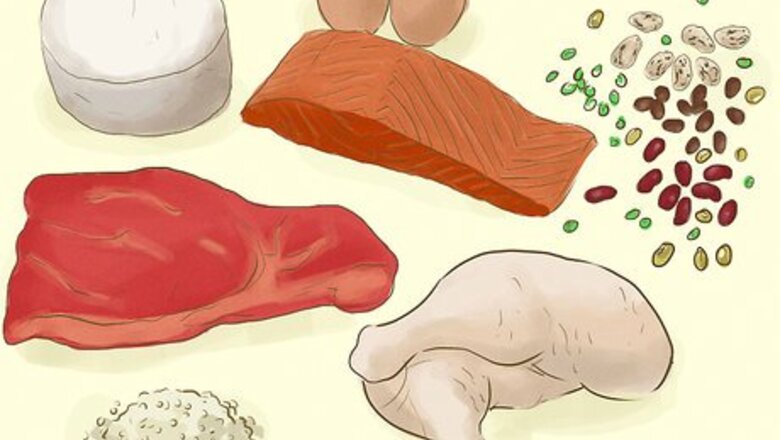
views
Effective Approaches
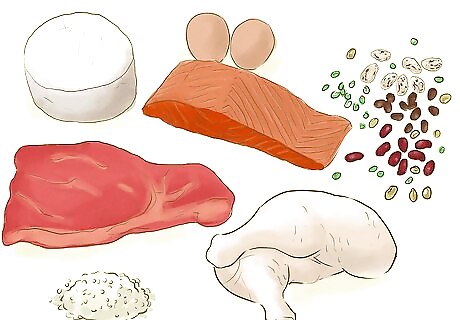
Eat the right amount of protein. You probably know that the body builder's diet is very high in protein. Growing muscles do need quite a lot of it, but past that point any extra protein is just calories, and therefore less effective than carbs. For most people, 0.8 grams of protein per kilogram of bodyweight per day should be plenty. However, body builders need to get between 1.2 and 1.7 grams of protein per kilogram of body weight. To find your weight in kilograms, divide your weight in pounds by 2.2. For example, 200 pounds divided by 2.2 is about 91 kilograms. To get your daily range for grams of protein, just multiply your weight in kilograms by 1.2 and then by 1.7. For example, 91 x 1.2 = 109 and 91 x 1.7 = 155. This means that your range for the day would be between 109 and 155 grams per day. (You can round your answers up or down to the nearest whole number for convenience.) Some good options for high-protein meals include: London broil/top round steak, salmon, chicken breast and pork tenderloin. Being vegetarian or vegan doesn't mean you can't eat like a body builder. In fact, vegan body builders are becoming more and more common. Some vegan substitutes include soy (and other legumes), seitan, quinoa, buckwheat, and mycoprotein. For breakfast, try egg yolks and oatmeal, or high-protein cereal and a protein shake. Stay away from sugary cereals.
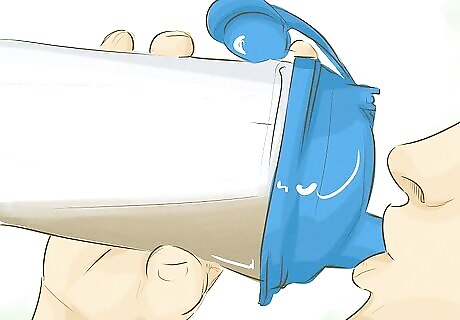
Use liquids for nutrition between meals. Protein shakes are a great way to get more energy in between meals. They're especially useful if you need to fight off junk food cravings. Whey protein is easy to digest and absorb.
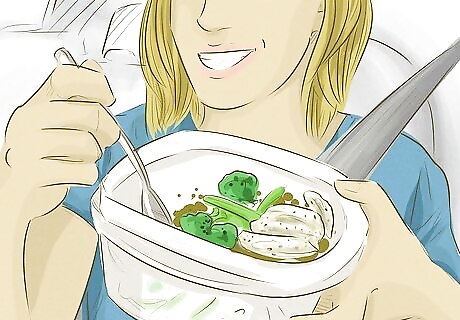
Never skip meals. Skipping meals is as bad as skipping workouts. Your body needs the nutrients in your meals to keep building mass. If life makes it hard to schedule meals, consider keeping a small cooler with you with a meal or two in it at all times.
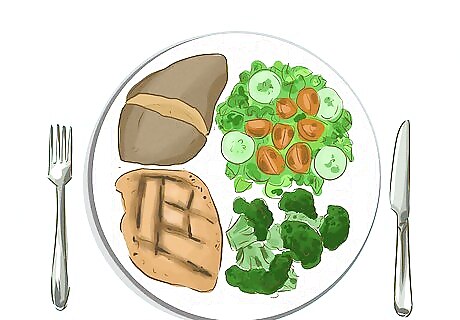
Keep it balanced. While protein is crucial, it's also important to eat balanced meals. In particular, vegetables and complex carbohydrates need to be a staple in your diet. Some bodybuilders recommend asparagus, broccoli, or spinach, but there are many other options.
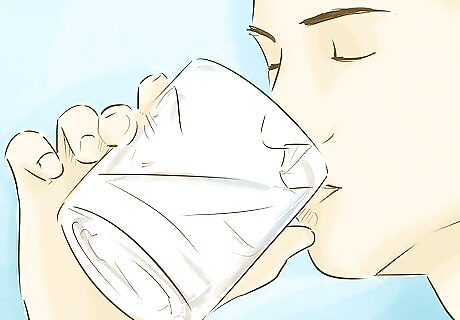
Stay hydrated. Your body is mostly made up of water. To keep it functioning smoothly, you need to stay hydrated. This is important for everyone, but especially for anyone doing hard training.
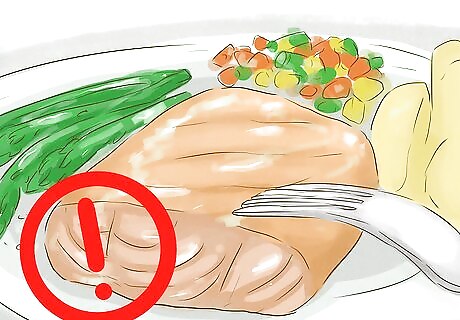
Moderate the fat. Some fat is fine, but avoid excessive amounts. Avoid foods with added fats like butter and fried foods. In particular skip the butter, oil, and rich sauces when possible. Use a light cooking spray in the place of butter and oil whenever you can.
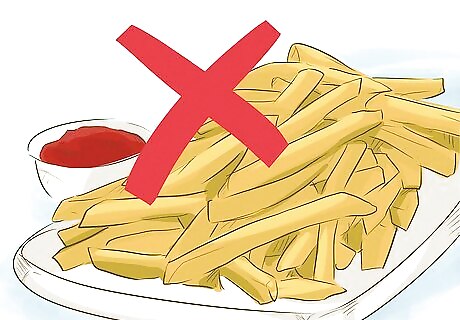
Avoid processed food. Body builders try to "eat clean." This means that you should avoid unhealthy choices like fast food and processed food. These foods turn into fat and not muscle. Remember, you are what you eat!
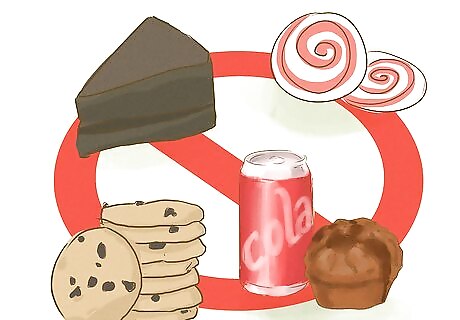
Don't eat sweets. You should avoid refined sugars and other simple carbohydrates in most scenarios. These foods are empty calories that take the place of healthier options that build muscle mass. Your best bet is to get these foods out of your home so you aren't tempted to eat them. Carbohydrates before bed are the worst. Because you won't be exercising for several hours, your body will store these carbs as fat. There is one exception to this rule: right after a hard workout, some simple carbohydrates are okay. If you're craving a bagel right after a session at the gym, you can indulge that craving, as long as you don't forget to eat your protein.
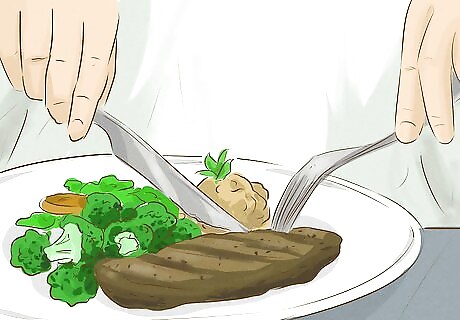
Dine out moderately and carefully. When you eat out, you lose some control over what goes into your meal. Restaurant food in general also usually contains more fat and salt than the food you prepare at home. Try not to eat out too often. When you do eat out, try to stick to clean proteins and simple vegetable side dishes. Scan the menu for the choice that best fits the body building diet.
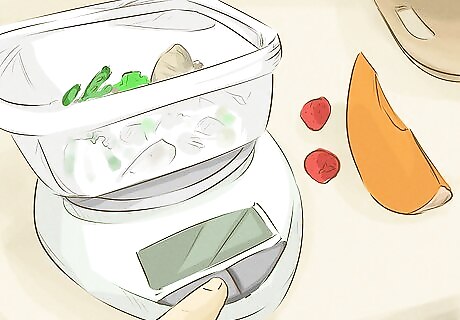
Don't eat too much. Many people hear "bulk up" and assume that means you have free reign to eat as much as you want. This is definitely not the case. Body builders need to watch the amount they eat just as much as anyone else. The math here is simple. If you are taking in more calories than you are burning off through exercise, your body will store those calories as fat. As a body builder, your calorie threshold might be higher than the average couch potato. But that threshold is still there. It's a good idea to read food labels, count calories, and make sure you are taking in as close to the right amount of protein as possible. You need lots, but there is such a thing as too much.
Possibly Effective Approaches
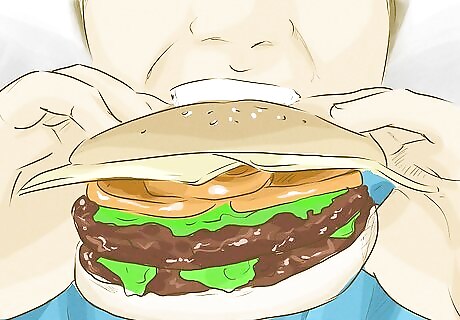
Cheat occasionally. It's usually a good idea to plan for occasional cheating. If you know you get to cheat on a meal, maybe once a week, it will help control the temptation to cheat at other times. You can use you "cheat" meal as a reward for reaching workout goals. This can be a strong motivator!
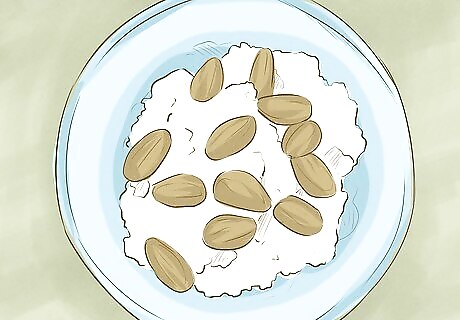
Snack on micellar casein protein before bed. A pre-bedtime snack can help you fight the urge for an unhealthy midnight snack. Some bodybuilders swear by micellar casein protein for this, either as a supplement or in cottage cheese. The argument goes that this protein takes longer to digest, letting your slower nighttime metabolism take full advantage of it. This is because it is a milk-derived protein that curdles when it contacts the acid in your stomach. This curdling slows down digestion and absorption of amino acids.
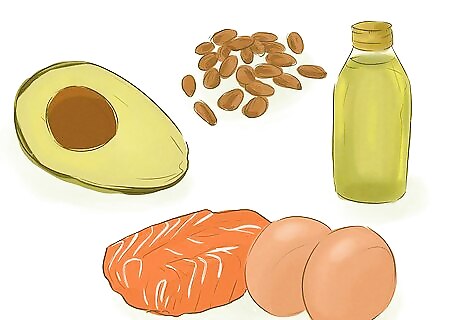
Consider changing the type of fat you eat. Fats pack in a lot of calories in a small volume, making it easier to meet your meal goals when bulking up. You definitely need some fat for a healthy diet anyway — the question is, what kind? Most experts tout monounsaturated fatty acids and Omeg-3 fatty acids, found in fish and avocadoes. Saturated fat is generally considered unhealthy, but some bodybuilders suggest fitting a small amount into your diet. Monounsaturated fatty acids and Omega-3 fatty acids are important for muscle growth. They can be found in foods like fish and avocados.
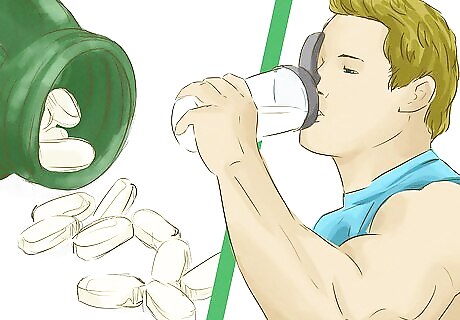
Consider taking supplements. Used in moderation, dietary supplements can help you fill in any gaps in your diet. Prepackaged body building supplements, along with a good protein powder, can compliment your daily meals. It's important, however, not to over-rely on supplements. You should be getting the bulk of your nutrition from fresh foods, which are better for your body. Supplement sellers often make inaccurate claims. Most will not have any effect that you couldn't replicate with a good diet.
Mythbusting
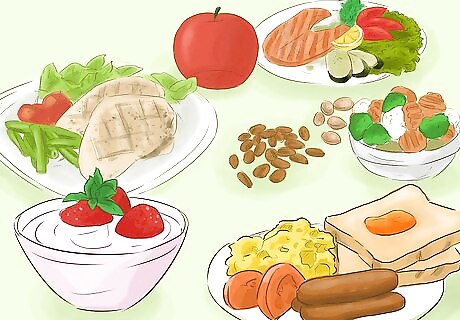
Choose your meal schedule based on what works for you. One common myth claims you need to eat 6+ meals a day to encourage glycogen storage, or replenish amino acids, or prevent catabolism. A thorough look at the evidence demolishes these ideas. What matters is the amount of calories and nutrients you consume, not how you spread it throughout the day. If you feel better and work out harder on 3-4 larger meals a day, go for it.
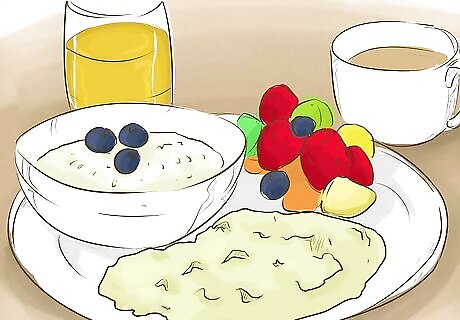
Treat breakfast just as you would any meal. Many bodybuilders overstate the importance of breakfast. In fact, eating in the morning has no extra effect on muscle mass compared to eating at other times. You should eat a healthy, protein-rich breakfast, but choose your portion size and mealtimes based on what makes you alert and ready to work out.














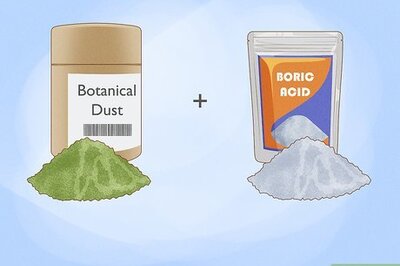


Comments
0 comment